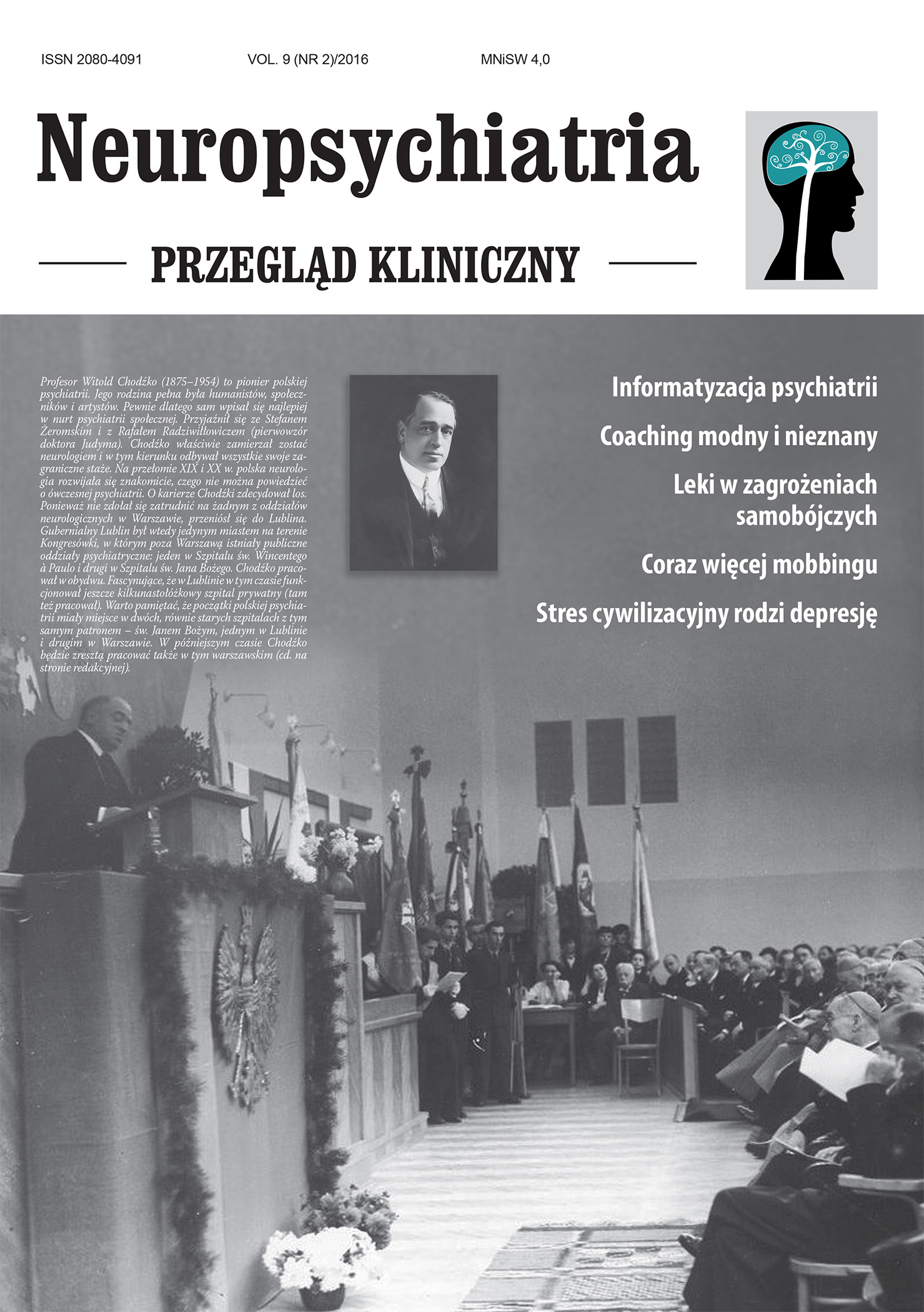New forms of civilization depression and their pharmacological treatment Review article
Main Article Content
Abstract
Many people may experience relatively low-grade or prodromal depression symptoms that actually can deeply affect their mental health. Feeling generally dissatisfied may mean something different than just simply not to be happy. Subclinical depression, masked depression or other forms of low mood disorders can be related to psychosocial problems like workaholism, burnout, chronic fatigue syndrome, mobbing, bullying or suicidal ideation. All those conditions can be equally dramatic and severe as full-blown depression. There are mainly preliminary pharmacological trials based typically on SSRIs like escitalopram in most of those indications.
Article Details

This work is licensed under a Creative Commons Attribution-NonCommercial-NoDerivatives 4.0 International License.
Copyright: © Medical Education sp. z o.o. License allowing third parties to copy and redistribute the material in any medium or format and to remix, transform, and build upon the material, provided the original work is properly cited and states its license.
Address reprint requests to: Medical Education, Marcin Kuźma (marcin.kuzma@mededu.pl)
References
2. Sussman S. Workaholism: A Review. J Addict Res Ther 2012; suppl 6(1).
3. OECD. Temporary employment. 01.07.2016.
4. Aholaa K, Hakanena J, Perhoniemia R, Mutanenb P. Relationship between burnout and depressive symptoms: A study using the person-centred approach. Burnout Research 2014; 1(1): 29-37.
5. Bianchi R, Schonfeld IS, Laurent E. Is burnout a depressive disorder? A reexamination with special focus on atypical depression. Int J Stress Manag 2014; 21(4): 307-324.
6. Madsen IE, Lange T, Borritz M, Rugulies R. Burnout as a risk factor for antidepressant treatment – a repeated measures time-to-event analysis of 2936 Danish human service workers. J Psychiatr Res 2015; 65: 47-52.
7. Amsterdam JD, Shults J, Rutherford N. Open-label study of s-citalopram therapy of chronic fatigue syndrome and co-morbid major depressive disorder. Prog Neuropsychopharmacol Biol Psychiatry 2008; 32(1): 100-106.
8. Leymann H. Mobbing and psychological terror at workplaces. Violence Vict 1990; 5(2): 119-126.
9. Signorelli MS, Costanzo MC, Cinconze M, Concerto C. What kind of diagnosis in a case of mobbing: post-traumatic stress disorder or adjustment disorder? BMJ Case Rep 2013; 2013.
10. Fiabane E, Flachi D, Giorgi I et al. Professional outcomes and psychological health after workplace bullying: an exploratory follow-up study. Med Lav 2015; 106(4): 271-283.
11. Ballard ED, Ionescu DF, Vande Voort JL et al. Improvement in suicidal ideation after ketamine infusion: relationship to reductions in depression and anxiety. J Psychiatr Res 2014; 58: 161-166.
12. Łoza B. Psychofarmakologiczna redukcja zagrożeń samobójczych. Neuropsychiatria. Przegląd Kliniczny 2016; 8(2).

